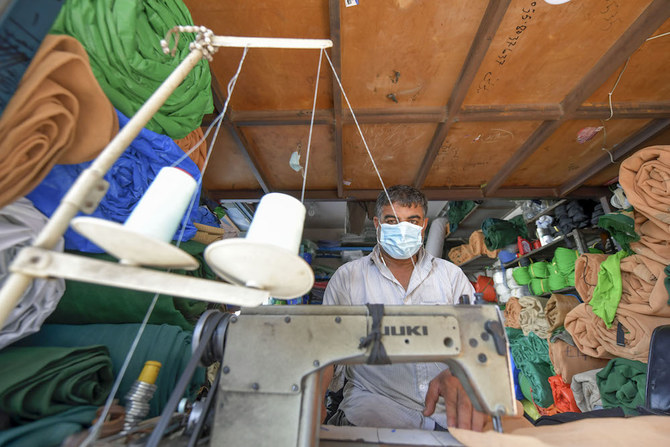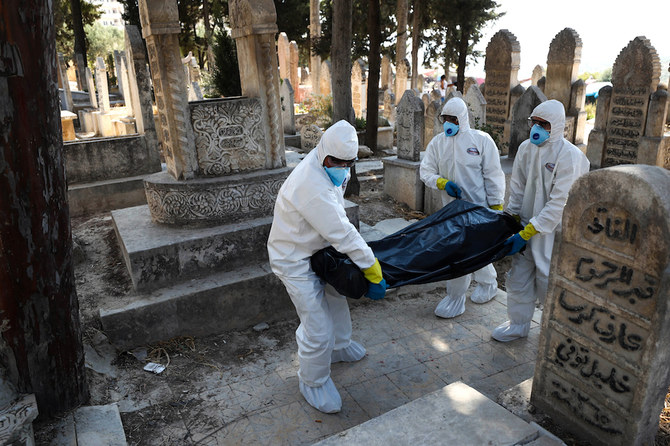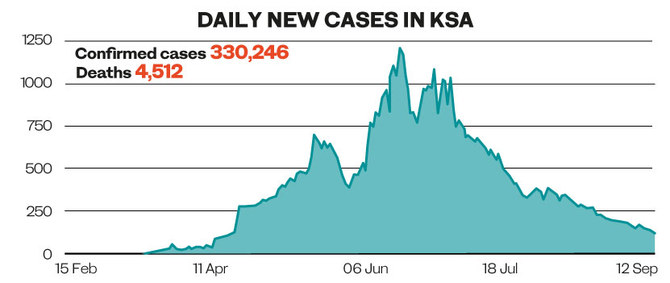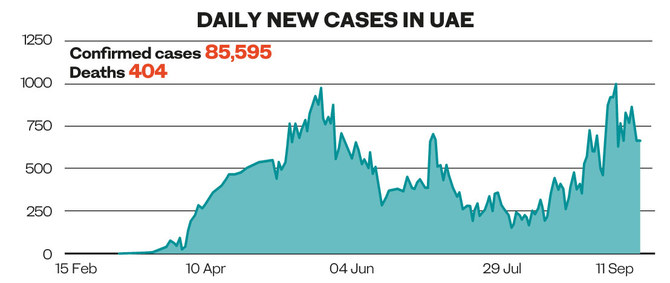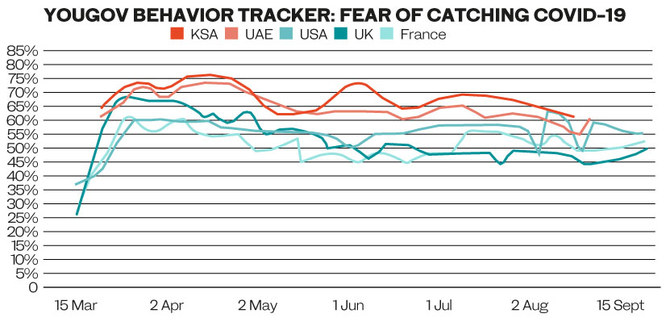DUBAI: At a time when coronavirus cases are rising worldwide, fear of contracting COVID-19 is actually falling, surveys in Saudi Arabia, the UAE and several Western countries suggest.
Since the World Health Organization (WHO) declared the pandemic on March 11, almost 32 million people have been infected and almost a million have died, according to Johns Hopkins University data.
The virus has thrown the world economy into turmoil, pushing many countries into recession. Experts believe a properly tested vaccine is still months away, forcing governments to tread a fine line between boosting the economy while keeping new infections at bay.
The virus and lockdown measures have fundamentally changed working habits, social interactions and even family life.
Over the past six months, the online research firm YouGov has been tracking public attitudes and behaviors surrounding the pandemic, using its global research panel of more than 8 million respondents.

A review of its latest data shows that emotions surrounding COVID-19 are far more complex than they were at the outset of the pandemic. In many key markets, fear of catching the virus is now lower than it was six months ago.
As many countries, including France and the UK, impose new lockdown measures in response to the long-anticipated second spike, YouGov’s data shows that consumer reactions to the pandemic are more muted, and that fear of catching the virus has fallen since March.
Sociologists attribute this to a growing acceptance of the “new normal.” After an initial wave of anxiety, a new pace of life has emerged. Meanwhile, governments and medical officials continue to urge the public to take precautions.

Health workers wearing protective jumpsuits, carry the body of a 62-year-old displaced Syrian man who died of the COVID-19 disease, to be buried in the town of Salqin, in the northwestern Syrian Idlib province on September 17, 2020. (AFP/File Photo)
On Sept. 20, the WHO reported a record one-day rise in global COVID-19 cases, with 307,930 new infections. The biggest increases were detected in the US, India and Brazil.
To date, at least 7.5 million people in the US have contracted the virus and more than 213,000 have died.
The Institute for Health Metrics and Evaluation at the University of Washington has forecast a further 400,000 to 600,000 deaths in the US by January 2021. Despite these warnings, fear of catching the virus was higher in the US in March than in September.
INNUMBERS
Coronavirus
* In March, 71 percent of Saudi residents said they were “very” or “somewhat” scared of catching the virus.
* By September the figure had fallen to 61 percent.
* In September, 51 percent of UK residents said they were “somewhat” afraid of catching the virus.
* Number of US residents taking additional hygiene measures has fallen 8 percent since June.
According to Johns Hopkins University, the US is the worst-hit country in the world, with about 620 deaths per million population.
By contrast, in Vietnam, where 81 percent of residents reported being “very” or “somewhat” scared of catching the virus, the death rate per 1 million people is just 0.4.
These changing attitudes are having an impact on public behavior, including willingness to return to work.
In its COVID-19 Global Impact Study, published on Sept. 2, US insurance company Cigna revealed that the prospect of returning to workplaces is creating new anxieties among employees.
The study, carried out across 11 countries, found that 42 percent of respondents were concerned about catching the coronavirus during the commute, face-to-face meetings or in common work spaces. However, the drive to return to the workplace has been met with a mixed response globally.

According to YouGov’s data, just 8 percent of French respondents said they are now working from home. Meanwhile, 27 percent in Saudi Arabia are choosing to avoid the office, and 23 percent in the UAE.
The data also indicates Saudi Arabia and UAE residents are more likely to adopt social-distancing measures than people in France, Britain and the US.
Since the UAE recorded the Middle East’s first four cases of the new coronavirus on Jan. 29, GCC governments have taken swift measures to reduce the impact of the virus on the region.
Saudi and UAE resident say they are more likely to avoid crowded places than those in France, the UK and the US. Among those surveyed, 72 percent of Saudi residents said they are avoiding crowded spaces compared with 63 percent of UK residents.

World Health Organization (WHO) Director-General Tedros Adhanom Ghebreyesus attends a press conference organised by the Geneva Association of United Nations Correspondents (ACANU) amid the COVID-19 outbreak on July 3 at the WHO headquarters in Geneva. (AFP/File Photo)
In June, when face masks were not yet mandatory in the UK, just 31 percent of UK residents reported wearing one in public places. By comparison, 80 percent of UAE residents reported wearing a face mask during the same month.
Following a change in UK government guidelines, the percentage of residents wearing face masks rose to 76 percent in September.
About 59 percent of Saudi residents say they avoid touching objects in public places compared with 42 percent of French residents, while 68 percent of UAE residents have improved their personal hygiene in response to the pandemic, compared with 58 percent of UK residents.

Poor adoption of social-distancing measures in northern hemisphere countries, which are fast approaching the winter influenza season, will be a marked cause for concern as medical facilities come under further strain. Indeed, the data indicates a trend toward public complacency at the very moment that cases are rising quickly.
Social-distancing measures have helped countries across the world reduce the number of new coronavirus infections from one day to the next — also known as flattening the curve. Yet self-reported YouGov data for the KSA and UAE clearly show people are becoming less vigilant regarding specific health and safety measures.
Mask use was down by 5 percent between June and September in Saudi Arabia and the UAE, while adoption of personal hygiene measures fell by 6 percent in both countries over the same period.
With mobility up across both nations, schools reopening and international travel increasing, the pandemic is an evolving situation. Authorities say complacency must not catch on or coronavirus will catch up.


